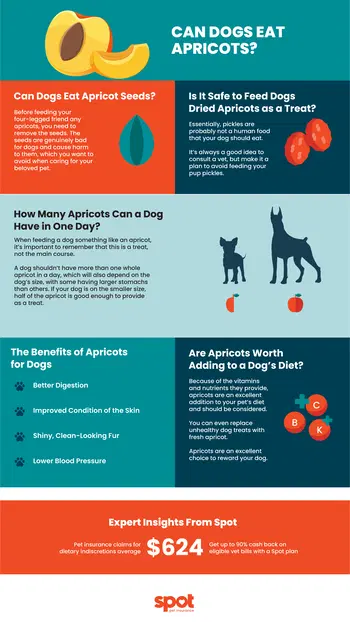If you could pick one favorite food to eat for the rest of your life, would it be apricots? It may be the fruit you enjoy most, often consuming them at home, on the go, and at work. And, there is absolutely nothing wrong with eating apricots because the wholesome, fresh fruit is naturally good for you. However, if you have a dog at home, you may ask, “can dogs have apricots?” Perhaps you want to share this sweet and refreshing treat with your four-legged friend because you love it so much. If so, you may be glad to know that apricots are typically safe for dogs to eat!1
The Benefits of Apricots for Dogs
Because the apricots aren’t necessarily considered harmful, you may want to give them to your dog at least a few times throughout the week, especially if you often have apricots at home. Before you add this fruit to your dog’s diet, it helps to know some of the benefits associated with apricots.
Key Nutrients in Apricots
vitamins A and E
Fiber
Antioxidents
These vitamins are good for humans AND dogs.
Health Benefits for Dogs
Some of the primary benefits of feeding apricots to your dog can include1:
Better digestion
Improved condition of the skin
Shiny, clean-looking fur that appears healthy
Lower blood pressure
Understanding the health benefits of apricots may inspire you to share this fruit with your dog. As long as you offer it in moderation, your pup can enjoy the natural nutrients apricots provide. In fact, if you feed your dog small amounts a few times a week, you might even notice visible improvements in their skin and coat over time—try capturing before and after photos to see the difference1.
How Much Apricot Can Dogs Safely Eat?
Daily Serving Recommendations
Apricots should be treated as an occasional snack, not a substitute for your dog’s regular meals. In general:
small dogs can have about half an apricot
medium dogs can have one apricot
large dogs can have slightly more, depending on their overall size and tolerance.
Always remove the seed, slice the fruit into small pieces, and supervise your dog while eating.
Portion Guidelines by Calorie Intake
Follow the 10% rule, which means treats—including apricots—should make up no more than 10% of your dog’s daily caloric intake. While apricots offer nutritional value, they aren't essential to your dog’s diet, so portion sizes should be adjusted based on your dog’s weight and calorie needs.
Risks of Feeding Apricots to Dogs
Can Dogs Eat Apricot Seeds?
No, seeds contain toxic cyanide. Apricot seeds, also called kernels, contain cyanide—a substance that is extremely dangerous to dogs. Ingesting even one seed can cause severe digestive distress and, if left untreated, may lead to life-threatening complications. Always remove the seed before offering apricot to your dog.
Is It Safe to Feed Dogs Dried Apricots?
Potential choking hazard. While dried apricots often have the seed removed, they can still pose a choking risk due to their chewy texture and small size. If you do offer a no-sugar-added piece of dried apricot, supervise your dog closely to ensure they don’t choke.
Prefer fresh apricots. Fresh apricots are a safer, more hydrating option. Slice and serve small, seedless pieces to your dog to let them enjoy the fruit’s benefits without added risk.
Can Dogs Eat Other Types of Fruits?
Other Fruits That Are Safe To Eat for Your Dog
Apricots are one fruit considered relatively safe for dogs, but several others are considered just as safe to give your dog. Here's a list of fruits that are safe for dogs:
We have compiled a big list of all the fruits your dogs should eat here.
Fruits That are Toxic to Dogs
Some fruits contain substances that are toxic or pose a choking hazard:
Grapes and raisins – Highly toxic and can cause kidney failure
Grapefruit – Can cause gastrointestinal upset
Tomatoes – Especially unripe ones or stems/leaves, which can be harmful

Expert Insights From Spot
While sharing our favorite foods with our pets can be tempting, it's important to remember that not all human foods are safe for dogs. Spot's internal data shows that pet insurance claims for dietary indiscretions average $642*, highlighting the importance of caution and research before sharing snacks with your pet.
Conclusion
Not only can dogs safely eat apricots in moderation, but they can also reap many potential health advantages from consuming them. Add this healthy, flavorful fruit to your dog’s diet in moderation to help improve their digestion and the overall appearance of your pet’s skin and coat!

With 15 years as a dog and cat parent, my pet articles are a mix of humor and firsthand experience - proof that the best stories often come with paws and purrs.
*Jan 2019 to Aug 2024 administrator claims data.
"Can Dogs Eat Apricots?" MasterClass, 22 Mar. 2022, https://www.masterclass.com/articles/can-dogs-eat-apricots.
“Apricot Poisoning in Dogs," Wag Walking, n.d., wagwalking.com/condition/apricot-poisoning.
The information presented in this article is for educational and informational purposes only and does not constitute or substitute for the advice of your veterinarian.











